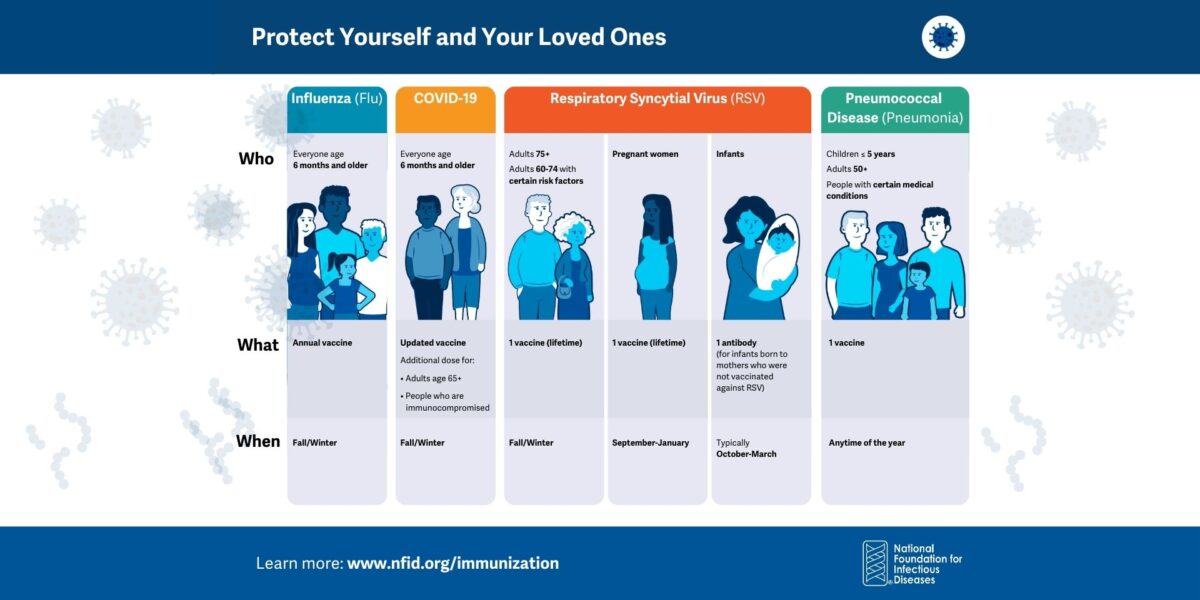
Myth: Flu vaccines can cause flu.
Fact: Flu vaccines are made with flu viruses that are either weakened, inactivated (killed), or recombinant (made without influenza viruses or eggs). Therefore, flu vaccines cannot cause flu. It typically takes 2 weeks for the flu vaccine to become effective and during those 2 weeks, it is still possible for a vaccinated individual to get flu or another respiratory virus.
Myth: Flu vaccination is not necessary every year.
Fact: Annual vaccination is critical to provide the best protection against flu, since the vaccine may change each year to match circulating flu viruses. The Centers for Disease Control and Prevention (CDC) recommends annual vaccination for all individuals age 6 months and older.
Myth: Healthy people don’t need a flu vaccine.
Fact: Anyone can get flu, even young, healthy people. Getting vaccinated each year is important for everyone age 6 months and older. And vaccination can help prevent the spread of the virus to others who may be vulnerable to flu and related complications.
Myth: Flu is nothing more than just a bad cold.
Fact: Flu is not the same as a common cold—it can be far more serious, and can cause high fever, headaches and body aches, chills, and severe fatigue for up to 2 weeks or more. Flu can also lead to more serious complications, including hospitalization and even death. On average, flu causes millions of illnesses, hundreds of thousands of hospitalizations, and tens of thousands of deaths in the US each year.
Myth: There is nothing you can do if you get flu.
Fact: Know the symptoms. If you, your child, or a loved one gets sick, contact a healthcare professional immediately to discuss treatment options. Flu antiviral drugs can make the illness milder, make you feel better faster, and may also prevent serious flu-related complications. Prescription antiviral drugs are recommended for people who have flu or suspected flu and who are at higher risk of serious flu complications, those with worsening flu illness, and anyone hospitalized with flu.
Myth: Vaccines can be dangerous and may have adverse health effects.
Fact: Most people do not experience serious side effects from flu vaccines. Some may experience a sore arm at the injection site, fever, muscle pain, and feelings of discomfort or weakness. These side effects typically last 1-2 days after vaccination and are much less severe than actual flu illness. Serious reactions are rare, and flu vaccines are given safely to millions of people every year.
Myth: All flu vaccines are approved for all age groups.
Fact: Everyone age 6 months and older should get flu vaccine every year. Different flu vaccines are approved for different age groups. For adults age 65 years and older, 3 flu vaccines are preferentially recommended, including higher dose and adjuvanted flu vaccines. For those younger, the Centers for Disease Control and Prevention (CDC) does not recommend any 1 flu vaccine over another.
Even in cases when vaccination does not prevent infection completely, it can reduce the duration and severity of illness and can help prevent serious complications, including hospitalization and death.
Reviewed September 2024
Source: Centers for Disease Control and Prevention
Related Resources

Kaitlyn’s Story (Flu)
Kaitlyn was a student at the University of Florida in Gainesville when she nearly died from flu

Respiratory Immunization Graphics
Graphics and sample social posts to help raise awareness about preventing COVID-19, flu, RSV, and pneumococcal disease

What Is an Antiviral?
Overview of antivirals—what they are, how they work, and what diseases they help treat
